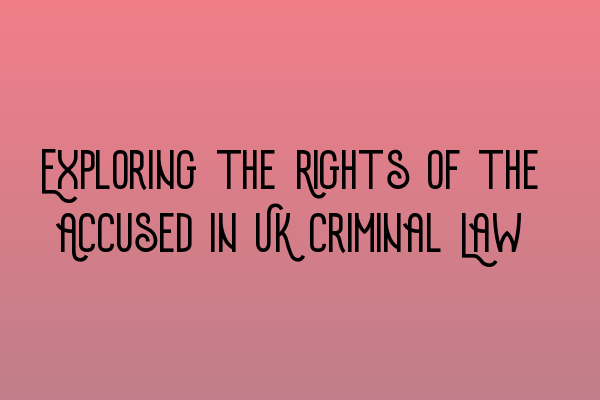Exploring the Rights of the Accused in UK Criminal Law
Welcome to the SQE Criminal Law & Practice Law UK blog! In today’s post, we will delve deep into the rights of the accused in UK criminal law. It is important to understand these rights, as they form the basis of a fair trial and ensure justice is served.
The Right to Legal Representation
One of the fundamental rights of the accused is the right to legal representation. This means that every person accused of a crime has the right to be represented by a solicitor or barrister throughout the legal process. This allows the accused to have a fair opportunity to present their case and defend themselves against the charges.
If you are interested in learning more about the legal representation of the accused, you may find our article on SQE 1 Practice Mocks FLK1 FLK2 helpful.
The Right to a Speedy Trial
Another crucial right of the accused is the right to a speedy trial. This means that the accused should not be subjected to unnecessary delays in the legal process. The right to a speedy trial ensures that justice is served in a timely manner and prevents the accused from being held in custody for an extended period without a proper resolution of their case.
For more information on how the right to a speedy trial is upheld in the UK, you may want to check out our article on SRA SQE Exam Dates.
The Presumption of Innocence
The presumption of innocence is a fundamental principle in UK criminal law. It means that every person accused of a crime is considered innocent until proven guilty. This principle ensures that the burden of proof lies with the prosecution and that the accused is not required to prove their innocence.
If you are preparing for your SQE 1 exams, you might find our article on SQE 1 Practice Exam Questions useful in understanding the concept of presumption of innocence.
The Right to Remain Silent
The right to remain silent is an important right of the accused. It allows the accused to refuse to answer questions during police interviews or court proceedings. This right protects the accused from self-incrimination and ensures that they cannot be forced to provide evidence against themselves.
If you are interested in enhancing your knowledge of criminal law, SQE 1 Preparation Courses can provide you with comprehensive study materials and guidance.
Other Legal Rights of the Accused
- The right to be informed of the nature and cause of the accusation
- The right to confront and cross-examine witnesses
- The right to present evidence and call witnesses
- The right to challenge the admissibility of evidence
- The right to have a public trial
- The right to appeal a conviction
For more information on criminal law and legal rights, we recommend checking out our SQE 2 Preparation Courses. These courses cover various aspects of criminal law and practice, providing comprehensive guidance for aspiring solicitors.
